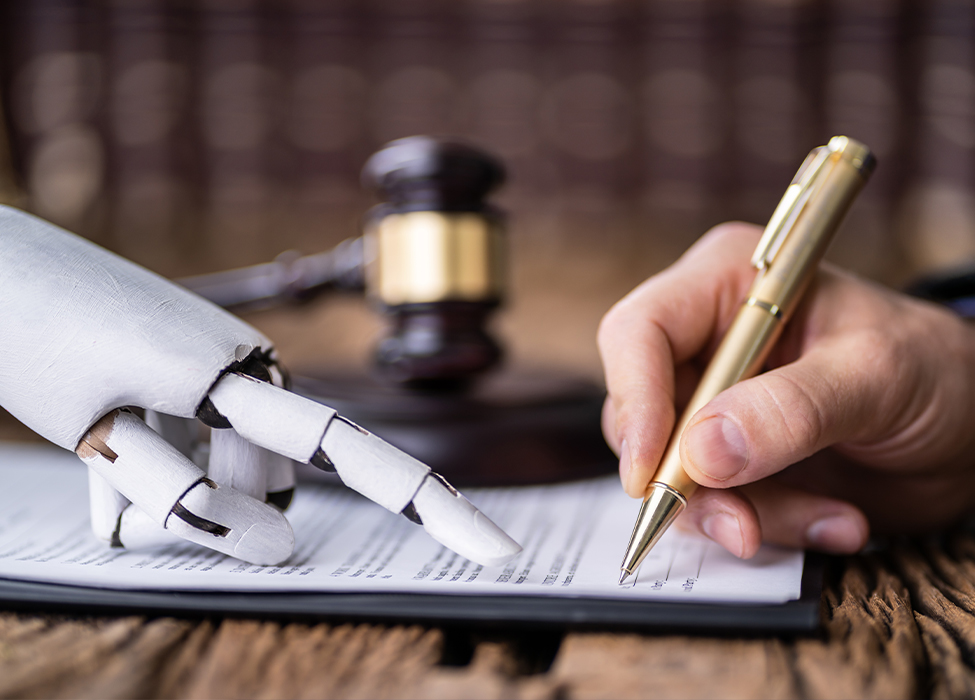Did you know that lawyers are using artificial intelligence (AI) to predict how successful their lawsuits will be? This is one example of how technology is altering the legal industry as we know it. Over recent years, legal technology has taken center stage in streamlining and automating traditional law practices, while also bringing new efficiencies to the foreground.
According to Statistica, in 2021, the legal tech market generated revenues of 27.6 billion U.S. dollars worldwide and is expected to reach 35.6 billion U.S. dollars by 2027. Gartner predicts that by 2025, legal departments will increase their spending on technology threefold. With this type of investment, it’s clear that technology is leading the way forward in the legal industry.
AI has rapidly found its way into the heart of legal technology. The combination of AI and legal technology is proving to be a potent mix that's transforming the legal landscape, creating more agile and competitive companies and redefining the way businesses approach legal challenges.
How AI is Powering Legal Technology
When integrated into legal technology, AI can drive efficiencies, increase accuracy, and reduce the time and cost involved in legal processes. Legal technology solutions leverage AI in a variety of ways, from automating mundane tasks to predicting legal outcomes and offering innovative solutions.
One prime example is AI-powered contract analysis. Traditional contract review is notoriously time-consuming and prone to human error. However, AI can read and understand the contents of a contract, automatically identifying key terms, obligations, and potential risks. This AI-driven legal technology significantly speeds up contract review, while also increasing accuracy and reducing costs.
AI also powers legal research tools. These tools can comb through vast quantities of legal documents, cases, and statutes in seconds. They can understand and analyze the context of search queries, making it possible to find relevant information more quickly and accurately than ever before. It can even automatically redact information!

The Impact of AI on Legal Technology and the Industry
With AI and legal technology, law firms and legal departments can now manage their work more efficiently. Automation of routine tasks, like contract reviews or legal research, allows professionals to spend more time on complex legal tasks and strategy development.
Moreover, the predictive capabilities of AI, such as predicting the outcome of cases or identifying potential legal risks, can provide businesses with a crucial competitive edge. This capability helps businesses to be proactive in their legal approach, thereby preventing costly legal issues before they arise.
AI and legal technology also help improve accessibility for legal services. Advanced tools enable smaller firms and businesses to access services that were once only within the reach of large corporations.
The Future of AI in the Legal Space
As AI continues to evolve, it promises to bring more advanced capabilities to legal technology. The rise of natural language processing, for example, will further enhance AI's ability to understand and analyze legal documents. This could enable AI to perform more complex legal tasks, such as drafting contracts or legal opinions.
In the longer term, we could see AI becoming a digital assistant for lawyers, providing advice, suggesting strategies, and even automating negotiation processes. It's also likely that we will see AI-driven legal technology being increasingly integrated into business processes, leading to an entirely new way of managing legal tasks.
It's important to note, however, that the rise of AI and legal technology does not mean the end of human lawyers. Instead, these technologies are tools that can help legal professionals to do their jobs more efficiently and effectively. Legal professionals will continue to play a crucial role in interpreting the law, advising clients, and making strategic decisions.

Exela's Legal Services: Harnessing Legal Technology for Optimal Solutions
Having explored the transformative role of AI in legal technology and its industry-wide impact, it's crucial to understand how businesses can practically leverage these innovations. One prime example is Exela's Legal Services, which seamlessly blend professional legal expertise with advanced legal tech to deliver efficient and cost-effective legal solutions. Our holistic approach encompasses various aspects of legal aid, from intricate contract reviewing to end-to-end eDiscovery services, powered by the latest advancements in legal tech.
The essence of our services is underpinned by a host of benefits. At the core of this is the provision of expert legal advice, facilitated by our legal tech's advanced analytic capabilities. Our experts, supported by AI and machine learning, provide accurate, in-depth insights that guide your business decisions.
Cost-effectiveness is a vital advantage of integrating legal tech into our service delivery. We employ advanced algorithms and process automation, ensuring that our suite of legal services is both high-quality and financially accessible, no matter your budget.
The integration of our legal services with legal tech does not only provide functional benefits. It also offers peace of mind as you're assured of having a team of legal experts augmented by powerful tech tools working in your favor. This allows you to direct your energy and focus on your business's core functions, knowing your legal matters are being handled efficiently.
Moreover, Exela's use of legal tech to deliver legal services helps streamline your business processes. Through automation and optimization, we enhance your business efficiency, reducing your legal overhead in the process.
Exela's Legal Services leverage the power of legal technology to provide unparalleled, cost-effective, and efficient legal solutions.
At Exela, we stand at the forefront of technology innovations, establishing an initiative to use AI to its fullest potential. We have integrated generative AI across our products and services, improving the quality of the services and software delivered to our customers across the globe.

Embracing AI and Technology in the Legal Industry
The potent combination of AI and legal technology is undeniably transforming the industry. It is driving efficiencies, increasing accuracy, and enabling more strategic and proactive legal approaches. As AI continues to evolve, its impact on legal technology is set to increase even further.
The legal landscape is in flux, but what's clear is that businesses that adapt to these changes and embrace the potential of AI and legal technology stand to reap the rewards. Embracing this reality is a strategic imperative for businesses aiming to stay ahead of the curve.
By leveraging AI and legal technology, businesses can not only navigate the legal landscape with more agility and confidence, but they can also redefine it. So let’s redefine it together with Exela’s Legal Services and create a better way to achieve great business outcomes.


